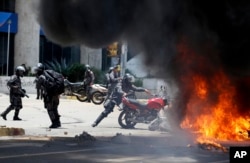Peru’s government is organizing a meeting of Latin American foreign ministers on what it calls Venezuela’s “illegitimate” vote Sunday approving a new government body charged with rewriting the country’s constitution.
The meeting, planned for August 8 in Lima, represents some of the international concern expressed Monday about the approval of a National Constituent Assembly. Its 545 members all support socialist President Nicolas Maduro and theoretically could supplant the opposition-led legislature, the National Assembly.
On Monday, the European Union joined Colombia, the United States, Mexico, Spain and at least seven other countries in saying they would not recognize the Constituent Assembly.
That kind of assembly, “elected under doubtful and often violent circumstances, cannot be part of the solution” to Venezuela’s crisis, European Commission spokeswoman Mina Andreeva said Monday in Brussels. She said he vote “has increased division and will further de-legitimize Venezuela’s democratically elected institutions.”
The EU’s foreign policy leader, Federica Mogherini, is overseeing a “joint response” from the 28-member bloc, Andreeva said.
Sunday’s election marked the bloodiest day in four months of anti-government protests, with at least 10 people killed in clashes around the country More than 110 have died since protests began in early April.
Maduro proclaimed the election Sunday was a resounding success. "The people have delivered the constitutional assembly," he said.
Venezuela's National Electoral Council said more than 8 million people, representing more than 41 percent of eligible voters, went to the polls Sunday to cast their ballots.
The opposition in the South American country said the unpopular measure would result in a socialist dictatorship and had called on Venezuelans to boycott the vote. Dozens of polling places in Caracas, the capital, were empty.
Details on what is likely to be included in a new constitution are unclear. Maduro has said it is the only way to pull Venezuela out of its severe economic and social crisis and stop the seemingly endless violence.
Critics assert that only Maduro supporters were candidates, including first lady Cilia Flores, and the first vice president of the ruling United Socialist Party, Diosdado Cabello.
The opposition contends the 545-member constituent assembly would dissolve the opposition-controlled congress and turn Venezuela into a socialist dictatorship. Maduro opponents are demanding early presidential elections.
The drop in global energy prices together with political corruption have destroyed oil-rich Venezuela's economy.
Gasoline, medicine, and such basic staples as cooking oil, flour, and sugar are scarce. Many Venezuelans cross into neighboring Colombia and Brazil to buy food.
Maduro has blamed the country's woes on what he calls U.S. imperialism and its supporters inside Venezuela. He has warned against intervention by the Organization of American States, saying that would surely lead to civil war.





